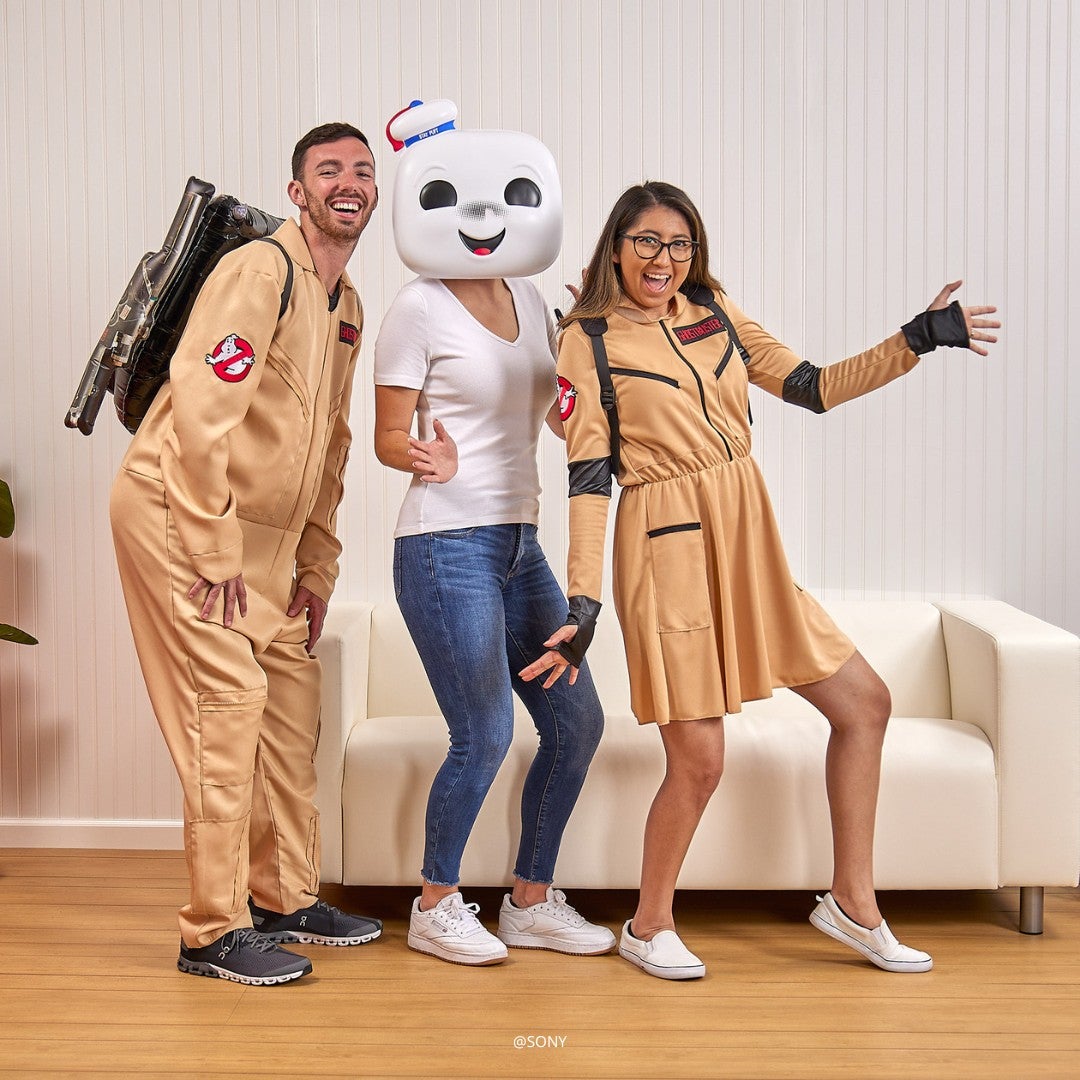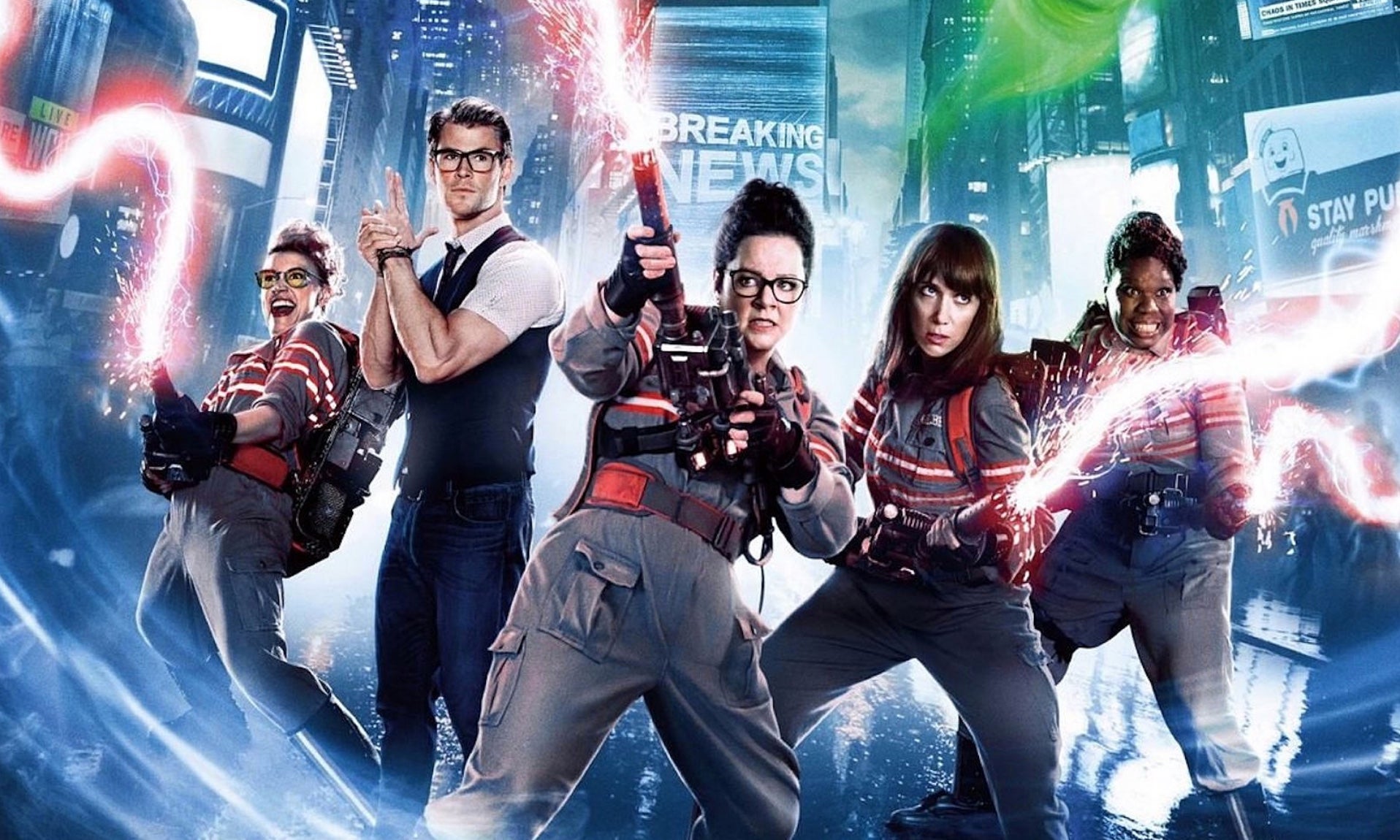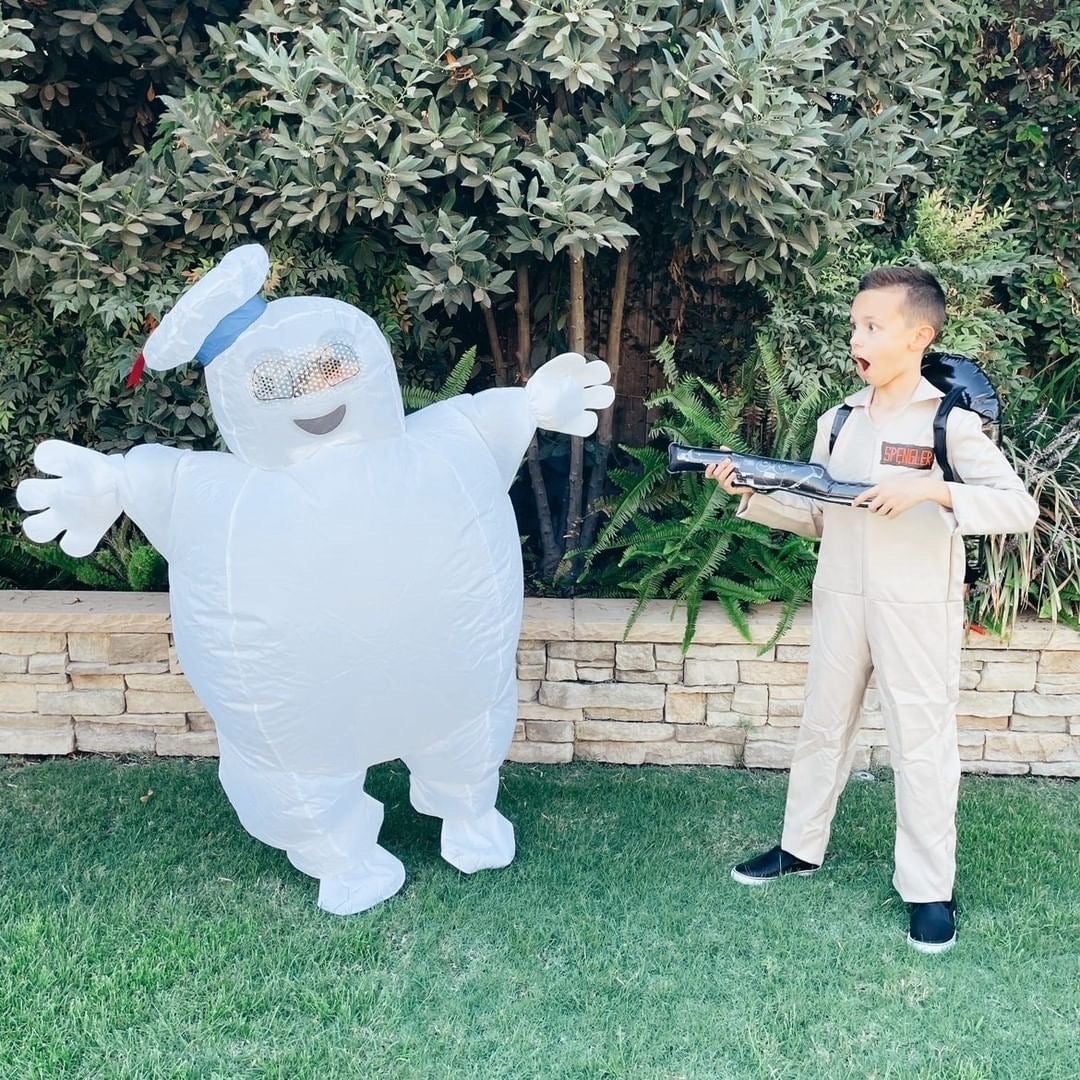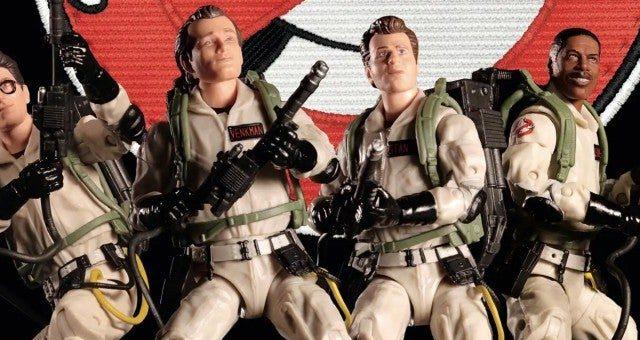Let’s say you’re making a big movie and you want to make sure it’s supported by merchandise. Who ya gonna call? Well, for Ghostbusters, one option is Jamie Stevens. An executive vice president at Sony Pictures Entertainment, Stevens oversees worldwide consumer products for Sony Pictures film and television, as well as helping PlayStation with its licensing in North America.
So basically Stevens is one of the people who says “Yes, you can make that Ghostbusters toy” or game or shirt or toaster oven, whatever the case may be. And with multiple new Ghostbusters films and shows currently on the horizon (and a few in the rearview mirror as well), we thought it might be fun to get Stevens on the phone to learn more about what goes into this incredibly cool job. How early in the process does she work with filmmakers? What does she know about the new products? And how does the studio decide what’s worthy of Ghostbusters and what’s not? All that and more below.
This interview has been edited for length and clarity.
Germain Lussier, Gizmodo: Obviously, Ghostbusters is a franchise that has been with Sony forever. Tell me when you started with the company and what your feelings toward the franchise were?
Jamie Stevens: I have been with the company for six years and I was a huge Ghostbusters fan my entire life, [since] the first one. And actually, it was an honour for me to be able to work on the franchise. Such an endearing, long-running franchise. And for quite a while after the first and second movies, we were a little dormant in terms of content, and now obviously as we’re moving forward [there’s much more.] We’ve really looked at this — because it’s such an iconic franchise — as something that we want to keep developing new content for, because there are those of us, like me, who saw it when I was a kid who now have kids and family who we want to introduce it to. Not only the original, but looking at it in an all-new, different way.
Gizmodo: So when you’re dealing with something with that kind of gravitas to it, in your opinion, what are the most important things to keep in mind when thinking about the way that people are going to digest the franchise?
Stevens: I think we have to keep the franchise relevant and it really starts with the fans. We want to know what they’re into, what’s trending, and develop products that kind of lean into what the fans want.

Gizmodo: OK. Yeah, but you also have to attract new fans, right? Because I’m 42 years old and a toy collector, so the things I’m buying aren’t at the same price point as things for younger children. So tell me a little bit about kind of balancing what a fan like myself would want versus, like you said, younger kids to keep the franchise alive.
Stevens: That’s a really good point. We have a mix of licensees who target all of our different fan groups. So it’s interesting. Hasbro is our toy partner. They have products specifically developed for kids, but then they also have collector products. Higher-end products for those collectors who really want to just buy them and sometimes not even open the package and hang on to them. So what we try to do is really, because we are a fan base that really goes to zero to 100, we cover all of the age groups. We try to make sure that we’re signing on licenses globally that target all of those fans. Even apparel. We have great stuff for kids. We do a lot of fashion collaborations for somebody who’s a little bit more trendy and fashionable. Obviously our costumes every single year do really well. Families love to dress up as Ghostbusters. And so we really look at, do we have something for every fan and diversity in partners?
Gizmodo: So does that come into play when looking for partners? Does a partner necessarily need to have that kind of huge breadth? Or can a company only make collector items or only kid items and still make Ghostbusters?
Stevens: Well, it depends on how other deals are done. Typically if you have a master toy partner, there are categories that are ironed out. So we work within what our contract is and we work with our toy partner — in this case, Hasbro — to do that. And then any other opportunities that we have that are within that contract that we want to do. Like this year, we just launched a cookbook and we have video games, we have home decor, stationary… it really is all about the fan at the end of the day.
Gizmodo: Do you ever worry about oversaturating the market? With action figures, we call them “peg warmers,” which is never a good thing, so how do you make sure to not overdo it?
Stevens: We work very closely with our licensees to make sure that we are trying to put together programs that just have the right level of products in the marketplace. And it really depends on if there is content. Like if there’s a movie releasing we know that we want to put more product in the marketplace than if it’s a time when there’s not a movie release. Or on Halloween, we typically spike. So we make sure that we have relevant products in the marketplace for the fans. And again, it’s all kind of in service to the fans. But we also want to make sure that that we’re not overflooding the markets and we work really closely with our licensees to get that right.

Gizmodo: Tell me a little bit about the process of working with licensees, be it older ones or signing up new ones.
Stevens: Well, we’re global. So if there’s a licensee that’s interested in working with us, we will see if they’re a fit for our business. We are constantly getting requests for new licensees, but we obviously want to make sure that they’re the right fit, especially for the fan, and that there is innovation and quality and that they understand how to bring the franchise to life.
Gizmodo: So what would make you say no to somebody who wants to be a partner? Is it that they just might not have the right kind of vision as you do?
Stevens: Yeah. They may not have the right kind of vision. They may not have the depth and breadth. They may not fit a need that we have. There are a lot of reasons why we might say no. And there are a lot of reasons why they might say yes. We may have a niche market. We may have too many licensees in a specific category and feel like we have that category covered. But we always take the opportunity if we see something that is unique and interesting. It’s something that we always try to work out, even if we do a test or it might be something that we say, you know what, the timing is not right now, but it might be in a year or two.
Gizmodo: Now, Ghostbusters has been very interesting for the past few years, especially during your time there. Sony tried a whole new direction with the 2016 film and it didn’t live up to expectations. And then I think that probably gave fans at least — don’t know about the executive level — a little bit of trepidation going into the new movie, which actually did very well. Saying that, I’m curious when you have those two different sides of a franchise, do you have to reevaluate? What does that do to your job coming off of a disappointing movie financially to a movie that is potentially a new franchise starter?
Stevens: Actually, the previous movie financially was not that… I think it was more in the culture and the media, the backlash, but financially it was not bad. We worked very closely, and the studio did, with Ivan Reitman and then obviously Jason Reitman. And it was really time, we thought, to reboot the franchise. But we wanted to do it in a way that brought us back to what the original franchise was about, and it made the most sense to have Jason direct it. Ivan was passing the torch. And Jason is an amazing storyteller and just the story of, you know, it going from a father to a son, which is really what the movie was about really made a lot of sense.

Gizmodo: Right, but in terms of licensing, because I mean, I don’t remember seeing a ton of merchandise for the Feig film…
Stevens: There was a lot of merchandise. There was a lot of merchandise.
Gizmodo: Oh ok.
Stevens: Because, look. Everyone was excited. It was a different iteration of the franchise. Everyone was excited for the franchise. And we did have a lot of products in the marketplace. But, you know, again, I think it’s about right-sizing. And everyone was very excited that a new film was coming out. The other thing is, we continually have a strong play that definitely spikes around Halloween, and we have a nice continual business on the classic product.
Gizmodo: In the past year, Ghost Corps [the company name in charge of Ghostbusters] have announced multiple projects coming out. There’s a Netflix show, an animated movie, a live-action movie. And obviously, you can’t speak to specifics on any of that, but how early does your team get involved?
Stevens: Our group actually is probably the first group outside of production who greenlit the movie. And actually, we get involved even before it’s greenlit. And we’re really fortunate because we have a great relationship with Ghost Corps; we had a great relationship with Ivan and he appreciated what we did for the fans, and Jason feels the same way. Jason calls himself the original Ghostbuster fan.
Gizmodo: Right.
Stevens: And he loves all the products. He loves the toys and he wants to work very early with us. So, on the [next] film, we’ve been talking about it since before the last movie was released. What do all the different iterations look like? How can we build the franchise? How do we make things potentially more toy-ettique and make products for the fans while staying true to the core story? So we get involved very, very early and I think that’s a really important thing and it’s really important, on something like this, to have a very close, collaborative relationship with the filmmakers.
Gizmodo: Is there ever pushback going in the other direction? I always think of the famous story that George Lucas put the Ewoks in Return of the Jedi just so they could make toys of it. I’m not sure that’s actually true, but that’s a hypothetical example people use of licensing and merchandise influencing the filmmakers. I’m curious, in terms of Ghostbusters, have you guys ever said, “Can you do this?” And they say, “That doesn’t fit.”
Stevens: Yes, we have. We talk about a lot of things. Sometimes there are things that are trending that just may not ultimately fit in the storyline. I think the important thing is, when you force anything and it’s not true to the DNA of the IP and the franchise, I think fans can suss out and smell that. It has to really be a part of the DNA of the franchise.

Gizmodo: Yeah, that makes sense for sure. So, without losing your job, how deep are you into working on new projects? How long have you been working on them, have you seen samples, can you say anything in a broad sense about future Ghostbusters projects?
Stevens: We are very involved with all the projects that Ghost Corps is working on.
Gizmodo: OK. There you go
Stevens: And the filmmakers and the showrunners keep us very much in the loop on all of it.
Gizmodo: And last thing, just in general, where do you see the future of the Ghostbusters brand in terms of licensing, and how excited are you about what’s to come?
Stevens: I’m very excited about the future of the brand. We have a lot of new content in the pipeline. The thing for me that makes my job a little easier is we have millions of fans all over the world who love Ghostbusters and continue to enjoy the franchise, whether it’s the original film or the new content that we have coming out. So I’m really excited to continue working with the filmmakers to tell those stories and bring those stories to life through innovative and fun products.
Want more Gizmodo news? Check out when to expect the latest Marvel, Star Wars, and Star Trek releases, what’s next for the DC Universe on film and TV, and everything you need to know about James Cameron’s Avatar: The Way of Water.
